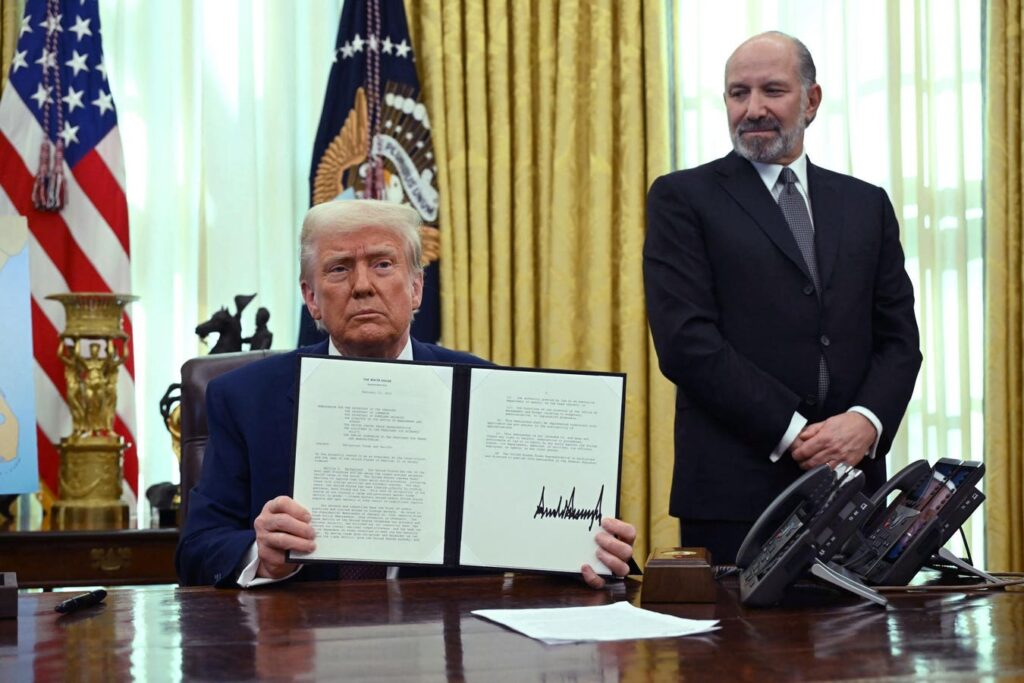With U.S. President Donald Trump escalating his trade disputes with the country’s closest economic partners, the risk of damage to companies, markets and consumers is rising rapidly.
The announcement on March 26 that the US will slap a 25% tariff on imported cars sparked immediate alarm from U.S. automakers and suppliers, and sent stocks plummeting.
In early February, the new administration introduced 10% tariffs on China and 25% on Mexico and Canada but later agreed to pause the tariffs on Mexico and Canada for 30 days, while keeping those on China intact. The suspended tariffs are scheduled to take full effect in April.
Trade deficits with these countries have continued to widen in recent years, with the deficit with Mexico nearly doubling since 2017 to $175.9 billion in 2024, according to U.N. Comtrade data. Similarly, the trade deficit with China remained deep at $319.1 billion, despite prior efforts to reduce it.
While intended to reverse these deficits and boost domestic industries, Trump’s trade policies could have wide-ranging detrimental effects on the U.S. economy, particularly in disrupting supply chains and increasing costs for businesses and consumers. Higher costs, reduced trade efficiency and retaliatory measures threaten to weaken the very industries these policies ostensibly aim to protect.
The Tax Foundation estimates that the announced tariffs would impact about $2 trillion in U.S. imports, or 50% of the total in 2024.
“Mexico, Canada, and China are America’s top trading partners, meaning these sweeping duties will ripple through every sector,” warned Nigel Green, CEO of deVere Group, a Dubai-based global financial advisory firm with more than 80,000 clients and $14 billion under advisement. “Higher costs on essential goods, from food to electronics to cars, will further squeeze household budgets already under pressure.”
Retaliatory tariffs could hit American agricultural exports, auto parts and key industries that rely on North American trade agreements, Green highlighted.
Analysis of the U.N. Comtrade database conducted by the Global Trade Algorithmic Intelligence Center (GTAIC), a Lithuania-based machine-learning based platform capturing international trade data, highlights the significance of the potential impact of the tariffs on Canada in particular. The country is major supplier of crude oil, aluminum, natural gas, and automobiles and other goods.
The U.S. imported around 4,500 unique products (out of 5,600 technically available) from Canada in 2024 based on the classification of merchandise of The Harmonized Tariff Schedule of the United States.
Canada supplies around 40% of U.S. crude petroleum imports, and proposed tariff increases could push up fuel costs, leading to inflation across multiple sectors.
The general rate of duty on imports of this product is 5.25 cents per barrel. A rough estimation of the amount of money the US charged as import duties of this good in 2024 was around $2.5 billion, according to GTAIC’s analysis.
“Once the rate of the duty has been increased by 10% (as proposed by the Trump administration), this amount will jump to $2.75 billion,” said Dzmitry Kolkin, chief economist at GTAIC. “Provided that there are no other means of getting crude petroleum oil at lower prices, this increase in import duty is likely to lead to higher gas prices.”
Additionally, 97% of U.S. lumber imports come from Canada, meaning tariffs on wood products contribute to higher home-building costs.
The impact extends to consumer goods as well. Canada and Mexico account for more than 70% of U.S. vehicle imports, and additional tariffs on passenger cars and auto parts could further drive up prices. Similarly, tariffs on imported natural gas and aluminum could increase costs for manufacturers, affecting everything from construction to electronics.
Meanwhile, the escalating trade tensions are creating a new wave of uncertainty for the U.S. industrial real estate sector that was already suffering from oversupply and the slowing of momentum in leasing activity. The tariffs against Canada, Mexico and China are already impacting port activity, and will likely delay leasing decisions and put upward pressure on construction costs, according to the latest CommercialEdge Industrial Report.
“These new tariffs comprise only half of the picture for the industrial market; retaliatory fees that other countries impose on American goods threaten manufacturers and exporters as well,” the report said.
Tariff uncertainty has prompted companies to stockpile imports, driving a 18% year-over-year increase in container shipments at major U.S. ports in January. However, trade concerns could slow port activity and disrupt supply chains, according to CommercialEdge.
“The industrial sector might benefit in the long run from manufacturing reshoring, but short-term disruptions include delayed leasing decisions and higher construction costs due to steel and aluminum tariffs,” the report said, “While reshoring aims to strengthen domestic manufacturing, the near-term consequences — trade volatility, higher costs and economic uncertainty — could outweigh potential long-term benefits.”
Read the full article here
















